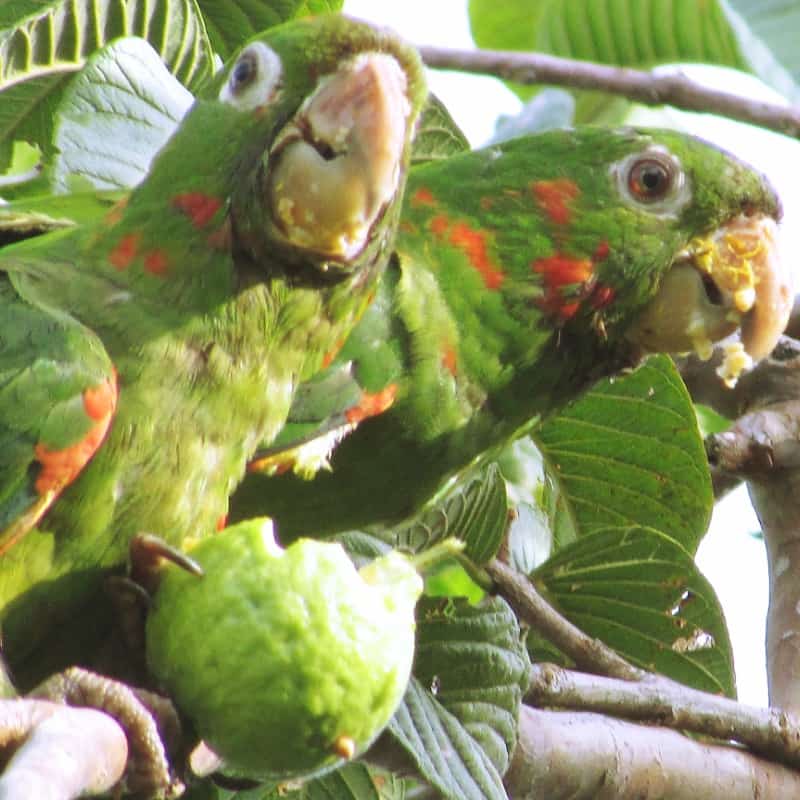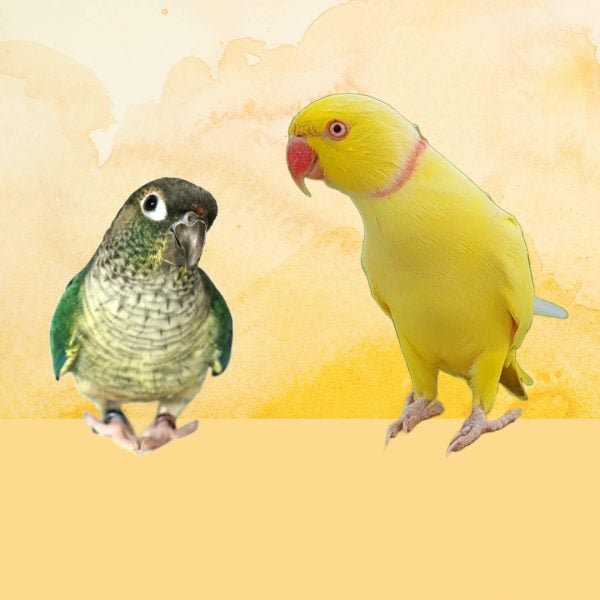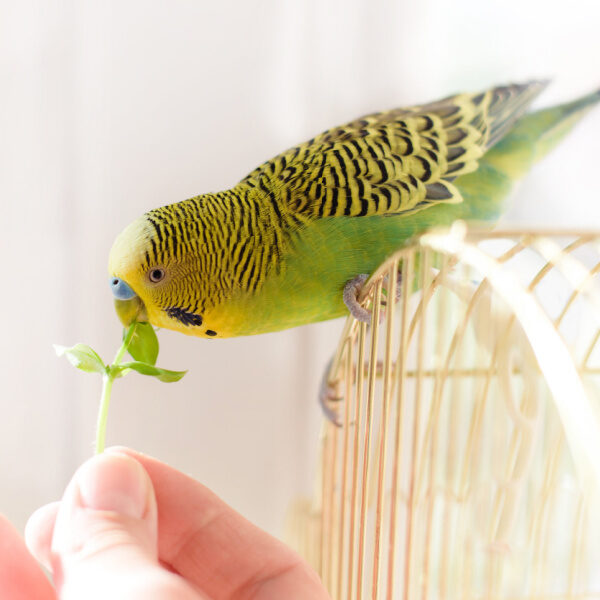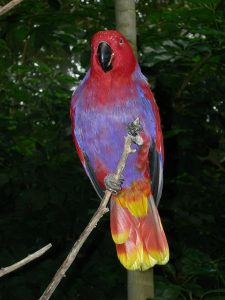Last Updated on by Catherine Tobsing
The thrill of inviting an unfamiliar winged companion into your home, acquainting them with their novel kin, and guiding them in navigating their alien environment is truly exhilarating while being scary at the same time.
Thus, the hour has arrived to amass an array of avian essentials and embark on a delightful journey with your feathered companion.
Proper nourishment is crucial for the well-being of your feathered companion.
Providing your pet bird with adequate nutrition is essential for a content and thriving life.
But what exactly should be on their menu?
Discover the types of foods your bird will relish and determine the right portion sizes for mealtime satisfaction.
Feeding Your Avian Friend: Dietary Preferences for Pet Birds
Different birds have distinct dietary preferences, making it impossible to completely determine a universally perfect diet.
Additionally, birds tend to be selective and untidy eaters, further complicating the task of providing optimal nutrition.
They often choose their preferred components and discard the rest, posing a challenge in terms of nutrition.
To maintain your pet bird’s eating enthusiasm, it is essential to incorporate a diverse range of fruits and vegetables into their daily meals.
Don’t forget that just because your feathered friend isn’t keen on a particular food at one point doesn’t mean they won’t eagerly consume it at another time.
If you’re unsure, reach out to the experts at Windy City Parrot for guidance on finding the ideal solution for both you and your bird.
Feeding your beloved feathered friend birdseed might appear as the go-to option.
Birds have been living on seeds since the beginning of time. I don’t understand why humans are so averse to feeding birds ~ birdseed.
Avian pellets can be a fantastic solution for fussy eaters. By feeding your bird pellets, you can ensure that their nutritional needs are met, as these pellets are designed to provide complete nutrition.
Each pellet is packed with essential nutrients, eliminating the possibility for your bird to selectively choose only their preferred bits.
This not only benefits your bird’s health but also offers you peace of mind.
To add diversity to the food dish, pellets are available in a wide range of forms, hues, and dimensions.
Keep in mind not all bird food pellets are created equal.
Hagen HARI produces pellets that increase protein and calories based on pellet/bird size.
It is important to offer a diverse range of fresh vegetables to your pet bird’s diet.
Dark, leafy greens like spinach and kale, along with zucchini and broccoli, are often enjoyed by most birds.
Additionally, you can include other vegetables such as squash, thinly sliced carrots, snow peas, parsley, cucumbers, and Romaine lettuce.
Take caution to avoid feeding your bird avocado, onion, or garlic as they can be harmful.
It is crucial to cut the vegetables into suitable pieces that are proportional to the size of your bird.
Juicy and colorful, fruits are nature’s delightful treats.
They come in a vast array of shapes, sizes, and flavors, each uniquely tempting in its own way.
These natural wonders are bursting with vitamins, minerals, and antioxidants that contribute to our overall health and well-being.
From crisp apples (apple seeds are toxic to birds) to succulent berries, fruits not only satisfy our taste buds but also nourish our bodies with their rich nutritional content.
Keep in mind today’s grocery store fruit has much more sugar content than fruit found naturally in nature.
So go ahead, indulge in the luscious sweetness of fruits and experience the vibrant essence of nature in every bite.
Birds and humans alike can find delight in a luscious, mature fruit.
It is the delectable delight that brings sheer joy to birds, although moderation is key.
Your bird’s diet should consist of only a small fraction of fruits, grains, and legumes.
Some examples include plain cooked brown rice, cooked pasta, cooked beans, cooked barley, or cooked oats.
The majority of pet birds find great pleasure in indulging themselves with a wide variety of fruits.
Tropical fruit assortment includes papayas, bananas, melons, mangos, oranges, kiwis, and apples.
Consider removing the seeds from the fruits you offer to your avian companions for an optimal treat.
We at Windy City Parrot feel strongly that citrus fruits like oranges can trigger negative behavior like feather plucking.
Looking at a bird’s digestive system, for survival reasons food moves from a bird’s esophagus into its crop where it can remain for up to six hours.
Acid from the fruit can irritate the crop causing “birdy heartburn.”
If you do give your birds citrus, keep the amount minimal and only serve in the mornings so it can move through the system with other foods and not sit in the crop all night alone.
When birds feel threatened they can simultaneously poop and regurgitate, which empties the crop rapidly shedding unnecessary weight to help a speedy retreat.
Similarly to vegetables, it is advisable to slice the fruits into suitable portions for your feathered friend.
What is the ideal frequency for feeding my pet bird?
To ensure that your bird stays satisfied throughout the day, maintain two or three different dishes ranging from the morning fresh dish, (that is removed after a few hours), to a mixed seed, nuts, dried fruits, veggies, and pellets bowl unless pellets are served in a third bowl.
Additionally, now and then offer your bird a modest serving of grains or legumes.
Should your feathered companion require over four hours to consume its portion of fruit, vegetables, or treats, it is advisable to remove any remaining food from the cage and endeavor to serve a smaller quantity during subsequent meals.
I talk about our own protocols for feeding 10 pet birds in this blog post.
Written by Mitch Rezman
Approved by Catherine Tobsing
Author Profile
Latest entries
 Feeding Exotic BirdsDecember 29, 2025How to Switch or Convert Your Bird From Seeds to Pellets: Real-Life Case Studies and Practical Guidance
Feeding Exotic BirdsDecember 29, 2025How to Switch or Convert Your Bird From Seeds to Pellets: Real-Life Case Studies and Practical Guidance Feeding Exotic BirdsDecember 16, 2025A Practical, Budget-Smart Guide to Feeding Birds Well
Feeding Exotic BirdsDecember 16, 2025A Practical, Budget-Smart Guide to Feeding Birds Well Bird EnviornmentsDecember 7, 2025Understanding Budgie Cage Bar Orientation: Myths, Realities & Practical Solutions for Vertical-Bar Bird Cages
Bird EnviornmentsDecember 7, 2025Understanding Budgie Cage Bar Orientation: Myths, Realities & Practical Solutions for Vertical-Bar Bird Cages Feeding Exotic BirdsDecember 5, 2025How Dr. T.J. Lafeber Rewrote the Future of Pet Bird Nutrition
Feeding Exotic BirdsDecember 5, 2025How Dr. T.J. Lafeber Rewrote the Future of Pet Bird Nutrition



